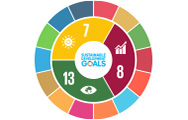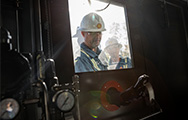Waste
We aim to reduce the amount of waste we generate. In our operations and supply chains, we are also starting to explore a circular economy approach, which is based on the concept that things are designed to last longer and to be reused, repurposed or recycled.
Waste performance
In 2019, we disposed of 2,113 thousand tonnes of hazardous and non-hazardous waste, which is broadly comparable with 2018.
In 2019, we sent more than 400 thousand tonnes off-site for recycling or reuse. Three of our downstream refineries sent more than 80% of their waste generated during the year for recycling or reuse in 2019.
Waste disposal
thousand tonnes
Enlarge imageVisit www.shell.com/managing-waste for more on our approach to waste.
We also assessed new waste management software that could help our efforts to reduce the amount of waste we generate. We worked with our supplier to configure the system specifically for Shell. We have started to implement the system in our Australian business and plan to roll it out to major facilities across our businesses over the next few years.
Our facilities in Australia have been implementing a number of waste improvement projects aimed at reducing waste to landfill and providing benefits to local communities. For example, the contractor that collects and recycles waste oil from our facilities in rural Queensland now also collects waste oil from farms during these trips, allowing this oil to be recycled as well.
We have also been working to improve the sustainability performance of our buildings by reducing consumption and waste. For example, Shell Business Operations centres in Kuala Lumpur, Malaysia, are aiming for zero food waste to landfill in 2020 and have implemented several waste projects. In 2019, they reduced total food waste at their offices by 70%.
We are a founding member of the global Alliance to End Plastic Waste and Shell employees are also taking steps to address plastic waste. For example, Shell companies in Nigeria, which use around 9 million single-use plastic bottles in their operations each year, pledged to reduce plastic by 50% in 2020 and 90% by 2021 (see Plastics).
Shell is looking at options to reduce the amount of material used in packaging by selling products, such as lubricants, in larger packs. We use recycled material in packaging where technically possible.
 Climate change
Climate change
 Sustainable development goals
Sustainable development goals
 Safety
Safety
 About our data
About our data
